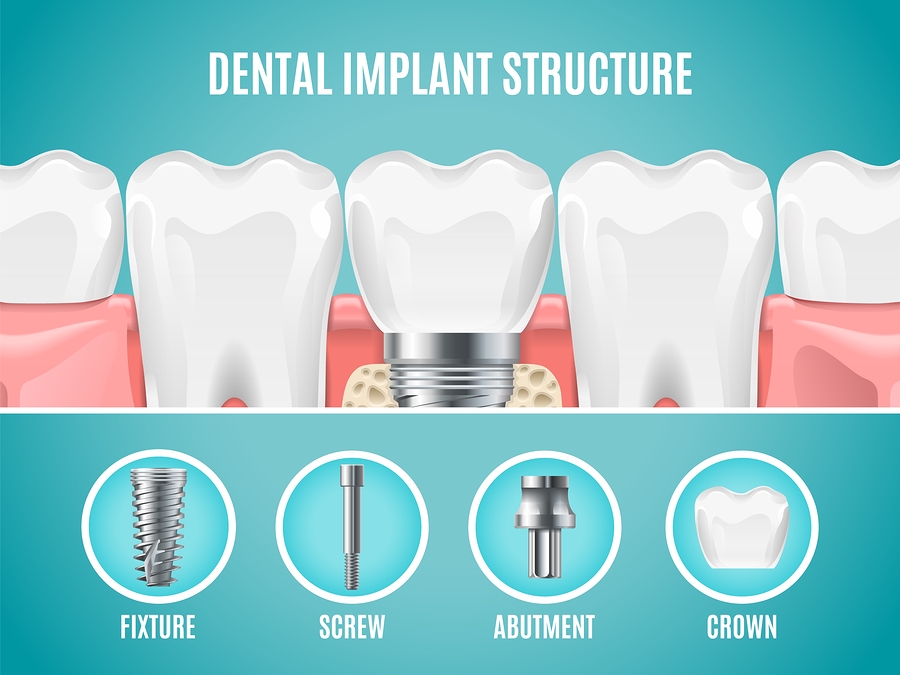The Of Dental Sense
The Of Dental Sense
Blog Article
Dental Sense Things To Know Before You Get This
Table of ContentsDental Sense - QuestionsAn Unbiased View of Dental SenseSome Ideas on Dental Sense You Should KnowThe Facts About Dental Sense Uncovered
are clinical gadgets operatively dental implanted into the jaw to recover a person's ability to eat or their appearance. They offer assistance for synthetic (fake) teeth, such as crowns, bridges, or dentures. When a tooth is shed due to injury or disease, an individual can experience issues such as rapid bone loss, defective speech, or adjustments to eating patterns that lead to pain.Dental implant systems contain an oral implant body and oral implant joint and might likewise consist of an abutment fixation screw. Kids dental. The oral implant body is operatively inserted in the jawbone in place of the tooth's origin. The dental implant abutment is normally affixed to the implant body by the joint addiction screw and prolongs through periodontals right into the mouth to support the attached man-made teeth
(https://giphy.com/channel/dentalsense1)Framework of The Oral Implant System choosing oral implants, talk with your dental service provider regarding the prospective advantages and risks, and whether you are a candidate for the treatment. Things to consider: Your total health is an important aspect in determining whether you are a great candidate for oral implants, the length of time it will take to heal, and the length of time the dental implant might remain in location.
Smoking might impact the recovery procedure and decrease the long-lasting success of the dental implant. The healing process for the implant body may take numerous months or longer, throughout which time you typically have a temporary joint instead of the tooth. the oral implant treatment: Meticulously adhere to the dental hygiene instructions provided to you by your dental company.
5 Easy Facts About Dental Sense Explained
Implant failing can cause the requirement for an additional surgical procedure to fix or change the dental implant system. Brings back the ability to eat Recovers cosmetic look Helps maintain the jawbone from diminishing because of bone loss Preserves the wellness of the bordering bone and periodontals Helps keep nearby (neighboring) teeth steady Boosts lifestyle Damages to surrounding all-natural teeth during dental implant placement Injury to the surrounding tissues during surgery, such as sinus perforation Injury during surgical treatment (for instance, fracture of bordering jawbone) Insufficient feature, such as feeling like the teeth do not attack with each other normally An experience that the tooth is loosened or turning in place arising from a joint screw loosening Implant body failing (looseness of the implant body) because of systemic infection, which may be more probable in individuals with unchecked diabetes mellitus due to local infection in bone and gum tissues sustaining the dental implant body as a result of postponed recovery, which might be more probable in people that smoke Difficulty cleaning up the gum tissues around the dental implant, leading to poor dental hygiene Neglected gum condition Post-surgical pins and needles as a result of nerve impingement or damage Always alert health care carriers and imaging try this out technicians that you have dental implants before any magnetic resonance imaging (MRI) or x-ray procedures.
FDA is not familiar with any kind of unfavorable events reported for MRI or x-ray procedures with dental implants. Dental implants systems are commonly constructed from products that adhere to international agreement standards of the International Company for Standardization (ISO) or ASTM International. These standards have information of what makes a secure material.

A dental implant is a framework that replaces a missing out on tooth. With screw-like tools, the specialist inserts a dental implant right into the jawbone, and it acts as a support for a synthetic tooth, called a crown.
Some Known Details About Dental Sense
Some individuals are not qualified for oral implant surgery. It is for oral specialists to operate individuals with: acute illnessuncontrollable metabolic diseasebone or soft tissue condition or infectionIf these concerns are solved, a person can have the surgical procedure. In, dental cosmetic surgeons avoid running on people with: If individuals with any of the above undertake oral implant surgery, there is a greater threat of the dental implant stopping working.

Dental dental implant surgical treatment is a customized process. It's not the very same for every person. However the following provides a general review of what you can expect your dental practitioner, oral cosmetic surgeon, periodontist or prosthodontist to do: Position the dental implant operatively. Offer you time to recover. Attach the message and final crown, bridge or denture.
Next, your specialist will carefully place the dental implant right into your jaw. If your dental implant is near the front of your mouth, your dental expert will certainly make a temporary tooth for you to wear up until you recover.
Dental Sense - An Overview
During the healing stage, your jawbone must fuse to the oral implant. This procedure can take anywhere from 3 to 9 months.
As soon as your dental implant heals, your dental practitioner can connect the joint (little adapter article) and your last restoration (crown, bridge or denture). This usually takes regarding one hour to finish and might need a second minor surgical treatment. You shouldn't feel any type of pain throughout your dental implant treatment because your service provider will use medicine to numb your periodontals.
Report this page